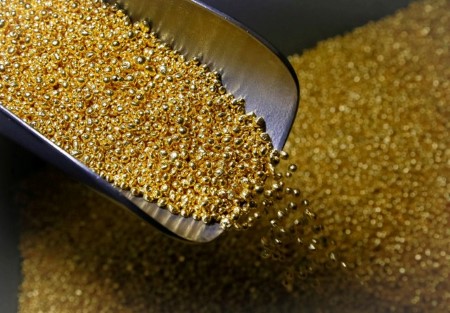




January Economic Update: Growth slows, prices rise
 DOWNLOAD
DOWNLOAD

Inflation Update: Up, up, and away?
 DOWNLOAD
DOWNLOAD

Quarterly Economic Growth Release: Growth takes on a slower pace
 DOWNLOAD
DOWNLOAD


Gold jumps as US dollar, yields dip after jobless claims data

June 8 (Reuters) – Gold prices climbed more than 1% on Thursday as the dollar and bond yields slipped after data showed US weekly jobless claims surged last week, cementing expectations that the Federal Reserve will pause its interest rate hiking cycle.
Spot gold rose 1.2% to USD 1,962.49 per ounce by 01:42 p.m. EDT (1742 GMT).
US gold futures settled up 1% at USD 1,978.60.
The number of Americans filing new claims for unemployment benefits surged last week, suggesting that the labor market was slowing amid mounting risks of a recession.
“This data shows a further weakness in the US economy, which is good news for gold as it will allow the Fed to be on hold,” said Edward Moya, senior market analyst at OANDA.
“If we get further softness in inflation, if the Fed holds and they really don’t signal a strong likelihood of a hike for the next meeting, then there is a good case for gold to edge higher.”
Following the jobs data, the dollar slipped 0.7% to a two-week low against its rivals, making gold less expensive for other currency holders, while benchmark US 10-year Treasury yields tumbled.
Money market participants now see a 71% chance that the US central bank will skip raising interest rates at its policy meeting next week, according to the CME’s Fedwatch tool.
Lower US interest rates put pressure on the dollar and bond yields, increasing the appeal of non-yielding bullion.
The US consumer inflation report for May, due on June 13, could provide more clarity about the health of the world’s largest economy.
“There’s a lot of uncertainty and you could see it in gold prices, if yields really start to back off here, then gold could move much higher,” said Daniel Pavilonis, senior market strategist, RJO Futures.
Elsewhere, silver jumped 3.4% to USD 24.24 per ounce, while platinum fell 0.7% to USD 1,010.93.
Palladium dipped 2.7% to USD 1,351.90, after falling to its lowest since June 2019 at USD 1,348.74 earlier in the session.
(Reporting by Brijesh Patel, Ashitha Shivaprasad, and Seher Dareen in Bengaluru; Editing by Elaine Hardcastle, Emelia Sithole-Matarise, and Krishna Chandra Eluri)
This article originally appeared on reuters.com





 By Reuters
By Reuters